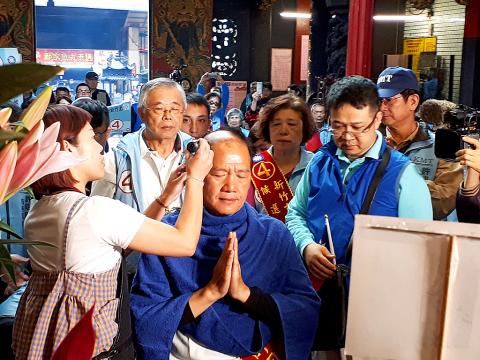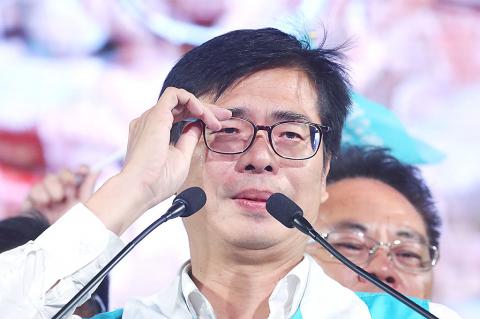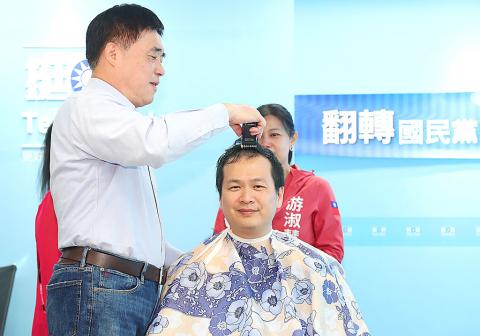When it became apparent that Chinese Nationalist Party (KMT) Hsinchu mayoral candidate Hsu Ming-tsai (許明財) was going to lose the election, he did the only thing any self-respecting politician would do: head to the temple, sit in front of an alter, pray to a deity and cry, all while having his hair shaved off.
Flanked by supporters at Hsinchu’s Du Cheng Huang Temple (都城隍廟), former Hsinchu mayors Shih Hsin-chung (施性忠) and Tung Sheng-nan (童勝男), and academic Jou Jwo-huei (周卓煇) each took turns using an electric razor to remove Hsu’s hair, a gesture that was meant to symbolize the candidate’s determination to get elected, stamp out black-gold politics and bring happiness and prosperity to his constituents.
Aside from sobbing, Hsu didn’t make a sound throughout the trim.

Photo: Hong Mei-hsiu, Taipei Times
Crying, praying or having one’s hair cut as a means of appealing for votes is a Taiwanese tradition dating back to the Martial Law era, when non-KMT politicians had to appeal to voters in extraordinary ways. Known as suzhubeiqing (訴諸悲情, literally: appealing to sadness), candidates — political heavyweights in tow — use this kind of behavior to show their sincerity and create an obligation in the minds and hearts of decided and undecided voters, who are made to feel guilty if they don’t vote in a particular way.
The gesture, however, smells of desperation. It is more likely that those candidates heading for defeat will blub in public.
Perhaps the most famous politician to use suzhubeiqing is former Democratic Progressive Party (DPP) legislator Chu Hsin-yu (朱星羽). Chu’s main tactic was to show up at funerals, prostrate himself at the entrance of the hall where the body was kept and proceed to crawl toward the casket, wailing over the memory of the deceased.

Photo: CNA
But Hsu’s suzhubeiqing trifecta is rare, with candidates typically appealing to only one of these behaviors.
CRYING OUT FOR VOTES
Crying on the campaign trail is de rigueur for many politicians. At a rally last Friday, Kaohsuing mayoral candidate Chen Chi-mai (陳其邁) took to the stage and cried in front of 200,000 supporters, as did Lee Chia-fen (李佳芬) — the wife of Han Kuo-yu (韓國瑜), the KMT’s candidate — in front of 150,000 supporters.

Photo: CNA
Taipei mayor Ko Wen-je (柯文哲) and DPP Taipei mayoral candidate Pasuya Yao (姚文智) choked up many times on the campaign trail as did New Taipei City mayoral candidate Hou You-yi (侯友宜).
In every case, the candidates talk about some wrong that has been committed against them and how they will survive the onslaught.
When asked by reporters why he had a tendency to blub, Ko said that it was the only way for him to handle all the political attacks against him. Others, such as Chen, said that it is all his supporters that lead him to cry.
VOWING TO THE GOD TO DO GOOD
The rough and tumble of political campaigns often lead politicians to make vows, as when DPP Taipei city councilor Wang Shih-cheng (王世堅) vowed to jump in the sea if Han was elected Kaohsiung mayor — a promise he had also made and fulfilled in 2008 when he told the media if the KMT won all eight of Taipei City’s legislative districts. As of press time, Wang had yet to take the dive.
Another common vow is one given to a deity, which consists of leading the media to a temple, making a promise and stating what the consequences will be if the promise is not kept.
In Tainan, mayoral candidate and former KMT, legislator Kao Su-po (高思博) vowed to never use the power of his office to obtain illegal or private gains for his family or take kickbacks. Flanked by former New Taipei City mayor Eric Chu (朱立倫), Kao said that if he breaks his vow he is willing to undergo the most severe punishment.
(Incidentally, the question has to be asked as to why Kao needed to make this promise in the first place.)
But many people thought that Kao’s vow was insincere because he didn’t specify what his punishment would be.
One candidate who did specify what his punishment should be is Shen Chen-hsun (沈暉勛), a candidate for mayor of Dounan Township (斗南) in Yunlin County. Shen’s vow at a Mazu temple came in response to accusations of bribery and vote buying, a “rumor,” Shen said, that wreaked havoc on his campaign.
He promised to pay NT$1 million to anyone that caught him breaking his vow.
SHAVE THAT HAIR
When 277 bald men appeared at a rally for Kaohsiung mayoral candidate Han Kuo-yu, they were referencing his own baldness and nodding to a tradition that dates back decades: shaving a candidate bald shows their honesty, integrity and sincerity because it is an act that no regular person would think of doing and it’s associated with monks and nuns.
Indeed, Han’s baldness became an important part of his campaign, as though it meant that he was intrinsically honest, the kind of stuff his fellow KMT members to the north were hoping would rub off.
“Feels pretty spicy,” said former Presidential Office deputy secretary-general and Taipei city councilor candidate Lo Chih-chiang (羅智強) last Wednesday at a press conference after KMT Vice Chairman Hau Lung-bin (郝龍斌) removed some of his hair.
Lo said he was imitating what he called Han’s 500 “bald warriors” (光頭戰士), adding that he wanted to be part of those fighting on behalf of the KMT.
So does employing suzhubeiqing on the campaign trail work? Probably not as increasingly most voters see this kind of politicking as a stunt that shows that the candidate is heading toward defeat.
In any event, Hsu lost out to incumbent mayor Lin, and Chen in Kaohsiung lost to Han, who intentionally ran a campaign that avoided as much as possible these kinds of appeals. Ko remains Taipei mayor and Kao lost out to Huang Wei-che (黃偉哲), the DPP candidate for Tainan mayor. Lo took the highest number of votes in his district, and Shen’s vow that he didn’t buy votes or commit bribery seems to have worked, as he won with 30 percent of the vote.

On April 26, The Lancet published a letter from two doctors at Taichung-based China Medical University Hospital (CMUH) warning that “Taiwan’s Health Care System is on the Brink of Collapse.” The authors said that “Years of policy inaction and mismanagement of resources have led to the National Health Insurance system operating under unsustainable conditions.” The pushback was immediate. Errors in the paper were quickly identified and publicized, to discredit the authors (the hospital apologized). CNA reported that CMUH said the letter described Taiwan in 2021 as having 62 nurses per 10,000 people, when the correct number was 78 nurses per 10,000

As we live longer, our risk of cognitive impairment is increasing. How can we delay the onset of symptoms? Do we have to give up every indulgence or can small changes make a difference? We asked neurologists for tips on how to keep our brains healthy for life. TAKE CARE OF YOUR HEALTH “All of the sensible things that apply to bodily health apply to brain health,” says Suzanne O’Sullivan, a consultant in neurology at the National Hospital for Neurology and Neurosurgery in London, and the author of The Age of Diagnosis. “When you’re 20, you can get away with absolute

May 5 to May 11 What started out as friction between Taiwanese students at Taichung First High School and a Japanese head cook escalated dramatically over the first two weeks of May 1927. It began on April 30 when the cook’s wife knew that lotus starch used in that night’s dinner had rat feces in it, but failed to inform staff until the meal was already prepared. The students believed that her silence was intentional, and filed a complaint. The school’s Japanese administrators sided with the cook’s family, dismissing the students as troublemakers and clamping down on their freedoms — with

As Donald Trump’s executive order in March led to the shuttering of Voice of America (VOA) — the global broadcaster whose roots date back to the fight against Nazi propaganda — he quickly attracted support from figures not used to aligning themselves with any US administration. Trump had ordered the US Agency for Global Media, the federal agency that funds VOA and other groups promoting independent journalism overseas, to be “eliminated to the maximum extent consistent with applicable law.” The decision suddenly halted programming in 49 languages to more than 425 million people. In Moscow, Margarita Simonyan, the hardline editor-in-chief of the